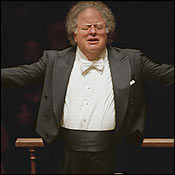
James Levine makes his first New York appearance as the music director of the Boston Symphony Orchestra this week in Carnegie Hall, conducting Mahler’s gigantic Symphony No. 8, and it’s a safe bet that the reviews will be ecstatic. They almost always are for Levine: Not since the days of Arturo Toscanini has a conductor been so extolled in the local press as a musician without flaw. Once, in a rare moment of candor, Levine said to an interviewer (me) that even he was amazed that a musician so heavily exposed to New York audiences could survive with virtually no backlash.
So Levine’s Boston tenure starts off on a high. And we will likely be hearing even more from him than ever as he settles into his new post, continues with the Metropolitan Opera, nurtures his protégés, and further curtails his work in Europe. Levine must surely now feel happier at home than abroad, where he has never received the sort of adulation he enjoys here. Then, too, there’s been increasing speculation about the state of Levine’s health, although, like everything else about this carefully guarded person, that subject remains mysterious, if not downright taboo.
What has never been a mystery is Levine’s thirst for work—a glance at his schedule for the current season leaves one wondering if he has time to see a film, let alone conduct a private life. At the Met, he has 47 performances of eight operas, plus an extensive concert series with the Met Orchestra. In Boston, Levine presides over 35 performances of a dozen programs, appears with the Boston Symphony Chamber Players, and will join pianist Evgeny Kissin in an evening of four-hand Schubert. His repertory choices for opera and concert are wide-ranging, if mostly rooted in the classics, although there are chronic grumbles about his taste in new music, which is mostly limited to academic types like Elliott Carter, Milton Babbitt, Charles Wuorinen, and John Harbison.
Despite his ubiquity, Levine’s musical personality remains, for some of us at least, just as mysterious as his private nature. I’ve read the raves over the years, but I can’t recall one that attempted to describe, let alone analyze, the specific nature of his interpretive aims and how they change our perception of the music. Usually, the praise consists of superficial compliments about instrumental excellence—and Levine could probably train a high-school band to play like seasoned professionals. But it’s one thing to get the notes right and another to make them mean something, and to my ears a typical Levine performance is all too often bafflingly impersonal and without an emotional core or interpretive commitment.
One can only hope that Levine’s art will deepen as he accepts new responsibilities, discards old ones, and embarks on the next phase of his career. Many conductors, when they pass 60, tend to shed problems and rethink their musical priorities, take new risks, and gain new insights. Levine, whose gifts as a practical musician have always been second to none, still has the potential to astonish us.
Boston Symphony Orchestra
Directed by James Levine; Carnegie Hall, October 25.